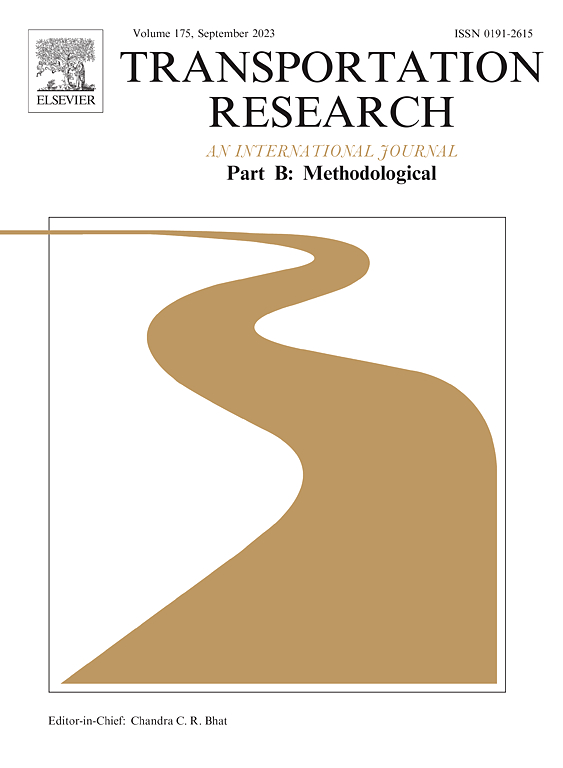每日动态分配的移动平均与指数平滑成本更新滤波器:定点稳定性和分岔理论分析
IF 6.3
1区 工程技术
Q1 ECONOMICS
引用次数: 0
摘要
日常动态分配的确定性过程(DP)模型可以采用一般的双方程分配建模方法,包括:-日常动态分配情况下的电弧成本更新递归方程;例如指数平滑(ES)或移动平均(MA)滤波器;-在日常动态分配的情况下,弧流更新递归方程;实例是ES过滤器。尽管用于成本更新的ES滤波器可能很接近MA滤波器,但科学界有人反对ES滤波器相对于MA滤波器具有无限记忆的基本假设;数值结果支持小内存深度(例如2或3天)的显著差异。本研究的主要原创性贡献是对记忆深度为2的MA-ES DP模型进行了形式不动点稳定性和分岔分析,并与ES-ES DP进行了比较。为此,提出并讨论了适用于一般不动点稳定性和分岔分析的Omega方法2.0。为简洁起见,没有包括非常长的证明。这项研究侧重于方法方面;因此,不包括数值例子。本文章由计算机程序翻译,如有差异,请以英文原文为准。
Moving average vs. exponential smoothing cost-updating filters for day-to-day dynamic assignment: fixed-point stability and bifurcation theoretical analysis
Deterministic process (DP) models for day-to-day dynamic assignment can be cast in the general two-equation assignment modelling approach, including the following:
- the arc cost updating recursive equation in the case of day-to-day dynamic assignment; instances are exponential smoothing (ES) or moving average (MA) filters;
- the arc flow updating recursive equation in the case of day-to-day dynamic assignment; instances are ES filters.
Even though ES filters for cost updating may well approximate MA filters, somebody in the scientific community argue against the underlying hypothesis of infinite memory for ES filters with respect to MA ones; numerical results support significant differences for small memory depths, say 2 or 3 days.
The main original contribution of this study is a formal fixed-point stability and bifurcation analysis of MA-ES DP models with memory depth 2, and a comparison with ES-ES DP. At this aim the Omega method 2.0, suitable for carrying out general fixed-point stability and bifurcation analysis has been developed and discussed. Extremely long proofs have not been included for brevity. This study focused on methodological aspects; thus, numerical examples were not included.
求助全文
通过发布文献求助,成功后即可免费获取论文全文。
去求助
来源期刊
CiteScore
12.40
自引率
8.80%
发文量
143
审稿时长
14.1 weeks
期刊介绍:
Transportation Research: Part B publishes papers on all methodological aspects of the subject, particularly those that require mathematical analysis. The general theme of the journal is the development and solution of problems that are adequately motivated to deal with important aspects of the design and/or analysis of transportation systems. Areas covered include: traffic flow; design and analysis of transportation networks; control and scheduling; optimization; queuing theory; logistics; supply chains; development and application of statistical, econometric and mathematical models to address transportation problems; cost models; pricing and/or investment; traveler or shipper behavior; cost-benefit methodologies.

 求助内容:
求助内容: 应助结果提醒方式:
应助结果提醒方式:


